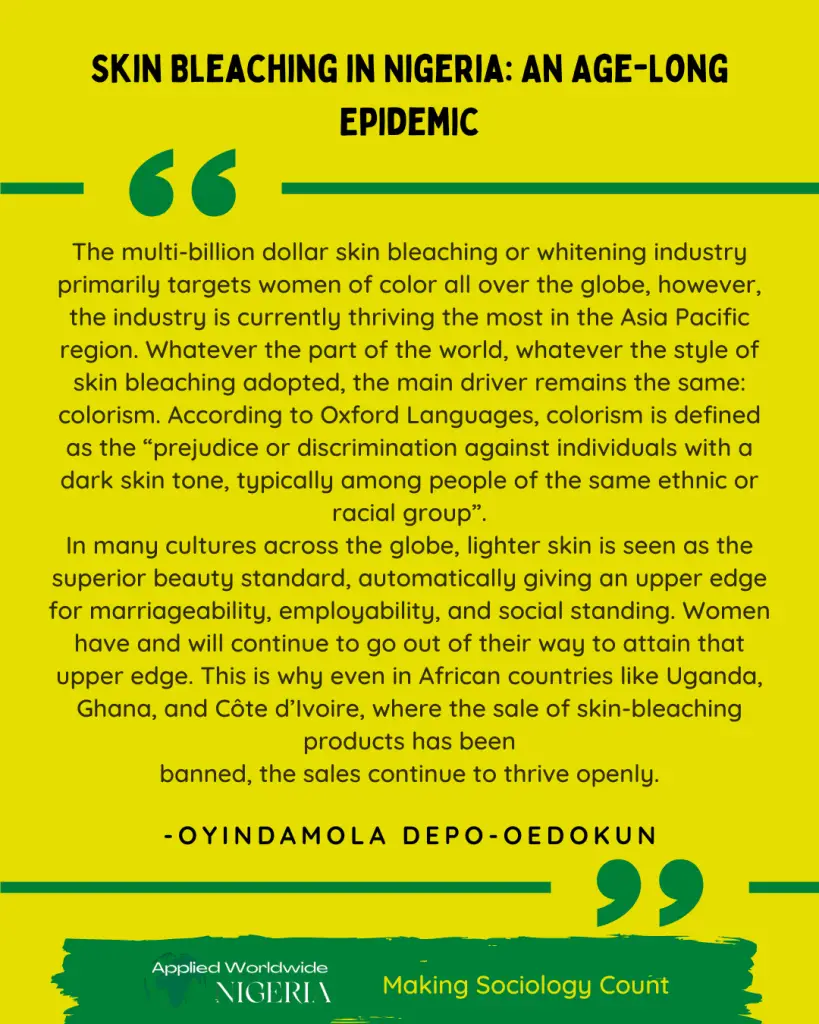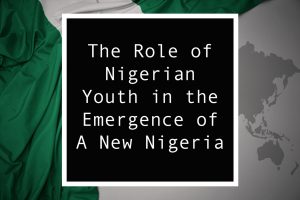Perhaps one of the most bizarre things Nigeria “carries first” in is the use of whitening or—as we like to call them— bleaching creams. According to various statistics over the years (including a study undertaken by CNN), Nigeria tops the list of African countries which use bleaching products the most. As of last year, it was reported that over 70% of Nigerian women used these products. In fact, skin bleaching in Nigeria has gotten so bad that the director of the National Agency for Food and Drug Administration Control (NAFDAC) Prof. Mojisola Adeyeye recently dubbed it a national emergency.
“These scary statistics have shown that the menace of bleaching creams in Nigeria has become a national health emergency that requires a multi-faceted regulatory approach,”
Prof. Adeyeye asserted. Adeyeye also mentioned her plans to conduct extensive media sensitization on the dangers of bleaching creams.

The Global Skin Whitening Industry
The multi-billion dollar skin bleaching or whitening industry primarily targets women of color all over the globe, however, the industry is currently thriving the most in the Asia Pacific region. Whatever the part of the world, whatever the style of skin bleaching adopted, the main driver remains the same: colorism.
According to Oxford Languages, colorism is defined as the “prejudice or discrimination against individuals with a dark skin tone, typically among people of the same ethnic or racial group”.
Skin Whitening in Nigeria and Colorism Across the Globe
In many cultures across the globe, lighter skin is seen as the superior beauty standard, automatically giving an upper edge for marriageability, employability, and social standing. Women have and will continue to go out of their way to attain that upper edge. This is why even in African countries like Uganda, Ghana, and Côte d’Ivoire, where the sale of skin-bleaching products has been
banned, the sales continue to thrive openly.
In a 2019 CNN report, Nigerian Dr. Ola Brown explained why simply banning the products was not enough:
“We must open up a conversation around skin color and beauty and the media, particularly the fashion media, which must feature other types of beauty beyond the Western ideal, to end this color bias. It is a major part of tackling what has become a significant public health problem. Without sustained work to change this perception, we will only be treating the symptoms, but never actually curing the disease.”
Common Ingredients for Skin Bleaching in Nigeria
Skin bleaching products often contain toxic ingredients which do irreparable damage to the skin when used for long durations. The most common toxic ingredients are :
Hydroquinone is Used in Some Whitening Products in Nigeria
This is perhaps the most popular skin-bleaching ingredient. It is used to treat pigment disorders by reducing the amount of melanin-producing cells in the skin. Some possible health consequences of its misuse are dermatitis, neurological problems, fetal growth retardation and ironically, darkening of the skin. In the US, the Food and Drug Administration (FDA) has even claimed the substance is possibly linked to cancer.
Topical Steroids are Used for Skin Bleaching in Nigeria
When these are used to treat some skin conditions, a common side effect is skin bleaching. Thus, some people take advantage of that by misusing steroids for the sole purpose of skin bleaching. However, prolonged use of such steroids without medical supervision comes with its own truckload of problems, including rashes, pustules, hirsutism, and infections.
Skin Bleaching in Nigeria Sometimes includes Mercury
Mercury is commonly found in skin-bleaching products due to its bleaching properties. It blocks the production of melanin, resulting in a lighter skin tone. The Minamata Convention on Mercury set a limit of 1 part per million (ppm) for cosmetics. Yet, some skin-bleaching products tested in countries worldwide have contained up to 40,000 ppm, an insanely unhealthy proportion. Some harmful side effects of the prolonged use of mercury include kidney and liver damage as well as neurological disorders.
Narrowing Down Skin Bleaching in Nigeria
In Nigeria, where the population is predominantly black, colorism can somewhat be referred to as racism’s distant cousin, albeit not nearly as brutal. Due to the lingering effects of colonialism and the transatlantic slave trade before it, there is still a strong, somewhat implicit inferiority complex, and lighter skin—closer to whiteness—is seen as more desirable.
It is only in recent years that black skin started really being celebrated with taglines like “melanin popping” and so on. I know a few dark-skinned people who only started to see themselves as beautiful recently. Before, they had parroted and internalized the “lighter is better” rhetoric to their own detriment.
But even at that, the celebration of “melanated” beauty is still largely a token. Derogatory remarks being made about dark skin are still commonplace. Light-skin privilege still prevails and skin bleaching culture is ever prominent, widely rebranded as “toning”, “brightening”, “making your skin shine”, “maintaining your real color” or whatever other euphemisms have been adopted over the years.
Factors Pushing Skin Bleaching in Nigeria
Although they are all rooted in colorism, these are the main agents propagating the skin-bleaching culture in the country:
Family
Before we even start looking outside at general society, the family may be the first unit to influence some people to bleach their skin. Parents may encourage their daughters to bleach to become more attractive to men and consequently increase their chances of marriage. It could even be as simple as mothers passing their skin-whitening products to their daughters, or children modeling their parents’ colorist beliefs without their parent’s knowledge.
Bullying
This could be snide remarks from strangers in public or bullying in schools that shape the victims’ mindsets from a young age. Even if things are okay on the home front, it’s hard for such not to deal a blow to one’s self-esteem, especially if it’s an impressionable child.
Media & Entertainment
Everything from more favorable depictions of lighter skin women in movies, to ridiculous cosmetics commercials in which women get lighter skin and things suddenly go better for them. When such things are repeatedly shoved down our throats, we begin to internalize them subconsciously. It is not uncommon to hear of women who felt they had to lighten their skin tones to secure more roles in the entertainment industry.
Ignorance
Too many buyers and sellers are not aware of the severe health hazards associated with skin bleaching. Consequently, they take warnings and government orders with levity and come to painful realizations when it is too late.
While establishing policies restricting the sale of skin-bleaching products is a step in the right direction, the issue of colorism must also be tackled from these angles. The “Black is Beautiful” rhetoric must drown out the “lighter is better” one on all fronts before any real change can be seen.
Sources: CNN, The Guardian.





